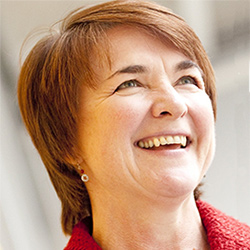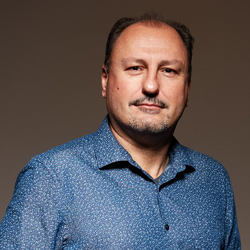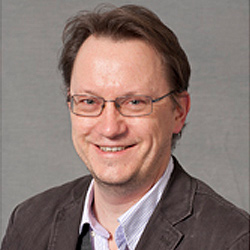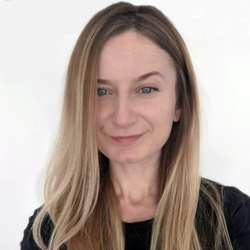
Professor
Geraldine Fitzpatrick
TU Wien
Software engineering is more than code – human skills are essential
21 June 2021
Read more
Professor
Lionel C. Briand
The University of Ottawa/
The University of Luxembourg
AI in Software Engineering: A 25-year Journey
22 June 2021
Read moreChallenges for empirical analysis and validation of cyber-cyber digital twins; experiences from building validation on Facebook’s Web-enabled simulation
23 June 2021
Read moreProfessor Geraldine Fitzpatrick
TU Wien, Austria

Keynote
date: Monday 21 June 2021
Software engineering is more than code – human skills are essential
In this age of digital transformation, software engineers are increasingly playing critical societal roles. There are of course the long-standing challenges around what makes for good algorithms, AI-based systems and the like. The COVID pandemic has also put the spotlight on what we might call the more ‘everyday technologies’ that have enabled new forms of remote work, education, social connectivity, health care, etc. Interestingly, many of these technologies have been under development since the 1990s and earlier, but without wide uptake or impact up to now. One explanation can be the narrow focus on engineering and technology per se and not understanding that software engineering is a fundamentally human endeavour and that putting technology to work is a complex whole systems challenge. This challenges us to see the people at the centre of these software engineering practices – not just the ‘users’ but the ‘engineers’ creating these solutions. Good software engineering skills are increasingly necessary but not sufficient. Good software engineering will also require fundamental human skills (social-emotional-ethical intelligences) to work in teams, and engage across disciplines and with multiple stakeholders, and to address different levels of concerns, negotiate diverse impacts, and so on. How do we develop these essential human skills?
Bio
Geraldine Fitzpatrick is a Professor of Technology Design and Assessment and leads the Human Computer Interaction group at TU Wien in Austria. She is an ACM Distinguished Speaker, and is recognized as an ACM Distinguished Scientist, an IFIP Fellow, and an IFIP TC-13 Pioneer. She has a diverse background, with a PhD in CS&EE (Uni of Queensland), an MSc in Applied Positive Psychology/Coaching Psychology (UEL), experience in academia, industry and consultancy/training, and a prior career as a nurse/midwife. In previous IT-related roles, she was Director of the Interact Lab at Uni. of Sussex, User Experience consultant at Sapient London, and Senior Researcher at the Distributed Systems Technology CRC and Centre for Online Health in Australia.
In all her work/careers she takes a concern for people-led perspectives, quality of experience and developing potential. Her academic research is at the intersection of social and computer sciences, with a particular interest in collaboration, health and well-being, and community building. She sits on various international advisory boards and steering committees and was general co-chair for CHI2019. She is host of the Changing Academic Life podcast series and runs leadership and development programs for academics at all levels.
Professor Lionel C. Briand
The University of Ottawa
The University of Luxembourg

Keynote
Date: Tuesday 22 June 2021
AI in Software Engineering: A 25-year Journey
There is a long history of applications of various Artificial Intelligence (AI) technologies in software engineering. From machine learning, evolutionary computing, to Natural Language Processing, AI has played an increasingly important role in making software engineering more predictable and automatable. This rising impact stems from increasingly powerful AI technologies, easy access to enormous computing power, and the availability of large amounts of software data in readily available development repositories. This talk will provide a reflection over 25 years of experience in applying and tailoring AI techniques to address software engineering problems at scale. I will try to abstract away and identify patterns of hard software engineering problems requiring solutions based on AI. Challenges will be characterized and interdisciplinary research avenues will be outlined.
Bio
Lionel C. Briand is professor of software engineering and has shared appointments between (1) The University of Ottawa, Canada and (2) The SnT centre for Security, Reliability, and Trust, University of Luxembourg. Lionel was elevated to the grades of IEEE Fellow and ACM Fellow He was the recipient of the IEEE CS Harlan Mills award in 2012. He also received an ERC Advanced grant in 2016- on the topic of modelling and testing cyber-physical systems- which is the most prestigious individual research award in the European Union. More recently, he was awarded a Canada Research Chair (Tier 1) on “Intelligent Software Dependability and Compliance”. His research interests include: software testing and verification, model-driven software development, applications of AI in software engineering, and empirical software engineering.
Mark Harman

Inna Dvortsova

Keynote
Date: Wednesday 23 June 2021
Challenges for empirical analysis and validation of cyber-cyber digital twins; experiences from building validation on Facebook’s Web-enabled simulation
Digital twins are often thought of as cyber-physical systems that model the behaviour of physical processes and systems. Software engineers’ uniquely virtual engineering material software is, itself, “cyber”, leading to the possibility of cyber-cyber digital twins. A cyber-cyber digital twin is a deployed software model that executes in tandem with the system it simulates, contributing to and drawing from that system’s behaviour. Although cyber-cyber twins share many of the attributes of cyber-physical digital twins, their doubly virtual nature also creates unique open research problems and opportunities, with applications in measurement, prediction, validation and optimisation of twin behaviours. This talk will outline Facebook’s cyber-cyber digital twin, WW, a twin of Facebook’s WWW platform, built using Web-Enabled Simulation. The talk will also cover experience, issues and approaches when collaborations between academia and industry.
This talk reports the results of joint work by John Ahlgren, Maria Eugenia Berezin, Kinga Bojarczuk, Sophia Drossopoulou, Inna Dvortsova, Johann George, Natalija Gucevska, Mark Harman, Maria Lomeli, Simon Lucas, Steve Omohundro, Erik Meijer, Rubmary Rojas, Silvia Sapora and Jie Zhang.
Biographies of the two joint keynote speakers:
Mark Harman is a full-time Research Scientist at FACEBOOK London, working on FACEBOOK's Web Enabled Simulation system WW, together with a London-based FACEBOOK team focussing in AI for scalable software engineering. WW is Facebook's Cyber-Cyber Digital Twin of its platforms, being built with the long-term aim of measuring, predicting and optimising behaviour across all FACEBOOK's platforms. Mark also holds a part-time professorship at UCL and was previously the manager of FACEBOOK's Sapienz team team, which grew out of Majicke, a start up co-founded by Mark and acquired by FACEBOOK in 2017. The Sapienz tech has been fully deployed as part of FACEBOOK’s overall CI system since 2017 and the FACEBOOK Sapienz continues to develop and extend it. Sapienz has found and helped to fix thousands of bugs before they hit production, on systems of tens of millions of lines of code, used by over 2.6 billion people world wide every day. In his more purely scientific work, Mark co-founded the field Search Based Software Engineering (SBSE), and is also known for scientific research on source code analysis, software testing, app store analysis and empirical software engineering. He received the IEEE Harlan Mills Award and the ACM Outstanding Research Award in 2019 for his work and was awarded a fellowship of the Royal Academy of Engineering in 2020.
Inna Dvortsova graduated from Taras Shevchenko National University of Kyiv with a masters in mathematics in 2013. She worked as a practicing software engineer at several companies in the IT sector before moving to take up a post as tech lead at Barclays in 2015, where she led data analysis, algorithms and deployment of stress testing. In 2018 she moved to Spotify, where she developed and deployed systems that supported and optimised the company's revenue streams. More recently in 2020 she started work at Facebook where she has been a lead engineer on the technical development, deployment and optimisation of Facebook's WW Web Enabled Simulation system. She and her co-authors have published results from this work at the 8th Genetic Improvement Workshop (GI 2020) and the 43rd International Conference on Software Engineering (ICSE 2021).